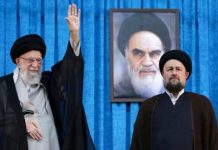dna
DCM SCHOFER: Ladies and gentlemen, good morning, and thank you for the warm welcome.
Today, we gather to celebrate the successful conclusion of the Police-Community Together Program – an extraordinary partnership among the Pakistani Police, the United States Institute of Peace, and the U.S. Embassy that has made significant progress toward a more inclusive Pakistani police force that elevates female police officers across Pakistan.
Throughout our 76-year bilateral relationship, the United States has worked with Pakistan to advance freedom and equality for Pakistanis, regardless of race, religion, or gender. Historically, Pakistan’s police force has faced challenges with female representation, with less than two percent women police officers across the force. Together, we are changing that:
With the support of Law Enforcement Agencies and USIP, we have seen an impressive increase of more than 20 percent in female police representation in Balochistan and Khyber-Pakhtunkhwa Police over the past three years.
The Punjab Police and its women’s police council have trained more than 1,800 women officers as victim support officers.
The National Police Academy revised and improved the 18-month initial command course to ensure that Assistant Superintendents of Police are better trained and positioned to emerge as change-making leaders.
Pakistan’s first-ever Women’s Police Councils empower female officers to assume leadership roles as station house officers. Many have been at the forefront of establishing anti-harassment committees among their colleagues and providing gender sensitivity training.
I want to especially recognize the brave women spearheading these changes as members of Pakistan’s police force. You have stepped up to meet the call to keep your communities safe. You respond to dangerous situations and challenging circumstances at real personal risk. On behalf of the government and people of the United States, you have our deep respect and admiration.
We owe it to you to ensure you have the resources and training you need not just to succeed – but also to lead. Thank you to our partners at USIP for your unwavering dedication to increasing the number of female police officers in Pakistan and fostering citizen-centric practices across the Pakistani police force. We look forward to building on these efforts.
And finally, let me extend my heartfelt gratitude to our partners in this effort. The support of parliamentarians, civil society members, civil servants, and police leaders is pivotal in ensuring every Pakistani has access to the justice they deserve.
To all of Pakistan’s champions of women in policing, the United States stands with you. We will continue to stand shoulder-to-shoulder with you to increase the number of female officers and champion our common causes of security and justice.Download
DCM SCHOFER: Ladies and gentlemen, good morning, and thank you for the warm welcome.
Today, we gather to celebrate the successful conclusion of the Police-Community Together Program – an extraordinary partnership among the Pakistani Police, the United States Institute of Peace, and the U.S. Embassy that has made significant progress toward a more inclusive Pakistani police force that elevates female police officers across Pakistan.
Throughout our 76-year bilateral relationship, the United States has worked with Pakistan to advance freedom and equality for Pakistanis, regardless of race, religion, or gender. Historically, Pakistan’s police force has faced challenges with female representation, with less than two percent women police officers across the force. Together, we are changing that:
With the support of Law Enforcement Agencies and USIP, we have seen an impressive increase of more than 20 percent in female police representation in Balochistan and Khyber-Pakhtunkhwa Police over the past three years.
The Punjab Police and its women’s police council have trained more than 1,800 women officers as victim support officers.
The National Police Academy revised and improved the 18-month initial command course to ensure that Assistant Superintendents of Police are better trained and positioned to emerge as change-making leaders.
Pakistan’s first-ever Women’s Police Councils empower female officers to assume leadership roles as station house officers. Many have been at the forefront of establishing anti-harassment committees among their colleagues and providing gender sensitivity training.
I want to especially recognize the brave women spearheading these changes as members of Pakistan’s police force. You have stepped up to meet the call to keep your communities safe. You respond to dangerous situations and challenging circumstances at real personal risk. On behalf of the government and people of the United States, you have our deep respect and admiration.
We owe it to you to ensure you have the resources and training you need not just to succeed – but also to lead. Thank you to our partners at USIP for your unwavering dedication to increasing the number of female police officers in Pakistan and fostering citizen-centric practices across the Pakistani police force. We look forward to building on these efforts.
And finally, let me extend my heartfelt gratitude to our partners in this effort. The support of parliamentarians, civil society members, civil servants, and police leaders is pivotal in ensuring every Pakistani has access to the justice they deserve.
To all of Pakistan’s champions of women in policing, the United States stands with you. We will continue to stand shoulder-to-shoulder with you to increase the number of female officers and champion our common causes of security and justice.Download

















